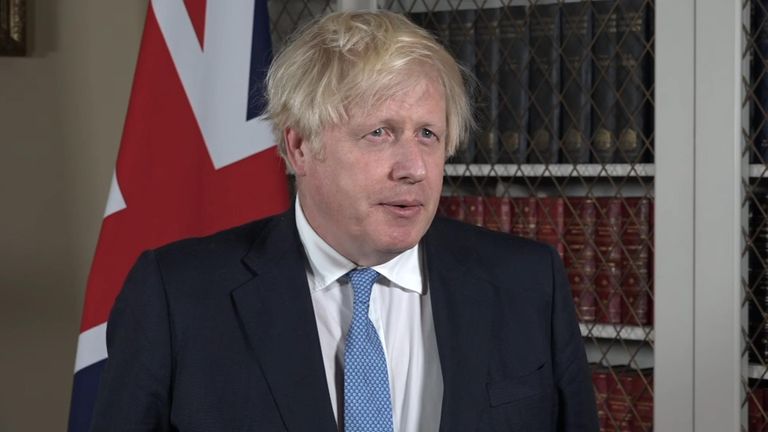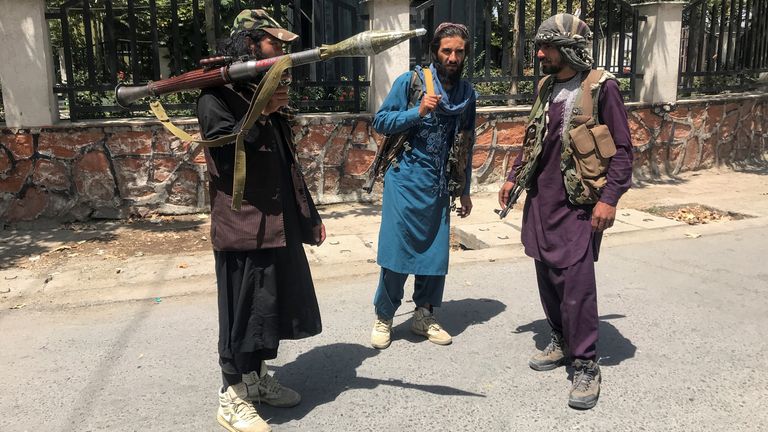In the coming hours the government is expected to set out its plan for bringing thousands of Afghan refugees to the UK.
There are roughly 3,000 Afghan nationals previously employed by British forces who are still in the country and likely eligible for resettlement.
On top of that, the government could commit to accepting tens of thousands of asylum applications from other Afghans who fear for their lives under the Taliban.
It is understood the "bespoke" scheme promised by the prime minister will be similar to that which was offered to Syrian refugees in 2015.
How did the scheme for Syrian refugees work?
The Vulnerable Persons Resettlement scheme was focused on taking refugees directly from camps in the states neighbouring Syria, such as Turkey, Jordan, Lebanon and Iraq, with the view to providing a "safe and legal route" to the UK.
The final number of Syrians relocated to the UK was 20,319.
Those admitted under the scheme received "humanitarian protection" status, which meant they were able to work, access benefits and could apply for family reunion.
Will the scheme for Afghan refugees work in a similar way?
The details are yet to be announced, but ministers believe the scheme for Syrian refugees was successful in creating a disincentive for those seeking asylum to attempt dangerous crossings into Europe via the Mediterranean.
By creating a system which enables Afghans to apply for asylum from nearby countries the hope would be to achieve a similarly direct route for those approved for resettlement in the UK.
However, the effectiveness of such a system would be highly dependent on co-operation with authorities in Pakistan, Iran, Turkmenistan, Uzbekistan and Tajikistan, which may prove more of a diplomatic challenge than was the case with Syria's neighbours.
The Home Office is also facing pressure from campaigners to ensure those who arrive in the UK via unofficial routes and subsequently apply for asylum will not be rejected by default.
What about the Afghan nationals who worked for British forces?
Between 2003 and 2014, when the UK withdrew all combat troops, approximately 7,000 local Afghans were employed to assist with translation and developing relationships with local communities.
According to the Ministry of Defence, 2,850 of those worked as translators for British forces on the frontline, largely in Helmand Province.
The Home Office says 3,300 Afghan staff and their families have been resettled in the UK since 2013, with nearly two thirds of those resettlements occurring since the end of June this year
What was the original resettlement policy for Afghans employed by UK forces?
In 2012 the government established what was known as an "Ex-Gratia" scheme for Afghan civilians who had been locally employed by UK forces.
According to the Home Office, this scheme was intended as "recognition of the UK Government’s gratitude for the service of Afghan interpreters, rather than any risk they may face".
The "Ex-Gratia" scheme was only available to individuals who had been directly employed to work in "dangerous and challenging roles in Helmand" for at least 12 months. Those who had been dismissed for disciplinary reasons or who had been employed as contractors did not qualify.
A further "intimidation policy" was in place for those whose safety was under threat, meaning individuals employed in any role for any period could apply for resettlement within Afghanistan, or in extreme cases to the UK.
How has the resettlement policy changed in recent months?
The "Ex-Gratia" scheme was heavily criticised by former military leaders for not providing sufficient protection for those in need, and in December 2020 the government announced it would introduce a new Afghan Relocations and Assistance Policy, in light of the "the changing situation in Afghanistan".
Launched in April this year, the "bespoke resettlement scheme" offers relocation to any Afghans who are facing the risk of reprisals because of their employment by UK forces.
Initially this new scheme was not available to those who had been dismissed from their employment.
Follow the Daily podcast on Apple Podcasts, Google Podcasts, Spotify, Spreaker.
But in July more than 40 former top military officials wrote an open letter to the prime minister, describing the scheme as "insufficient" and adding: "If any of our former interpreters are murdered by the Taliban in the wake of our withdrawal, the dishonour would lay squarely at our nation's feet."
In response the Ministry of Defence updated the policy earlier this month, making contractors and those who had been dismissed for minor administrative offences eligible and allowing applications to be submitted from Afghans living outside of the country.
What happens to Afghans successfully relocated to the UK?
Eligible Afghan former employees, their partners and their children are given permission to live in the UK for five years, at which point they can apply for leave to remain.
Local authorities are responsible for providing accommodation and support for integrating into the community, with some funding from central government.
What checks are carried out on Afghans applying for resettlement?
Security checks are carried out on every application for resettlement from Afghan nationals, whether they are former employees or not.
Officials insist the number of cases rejected is small when compared to the overall number of applications, and say a decision to reject an application is not taken lightly.
It is understood grounds for rejection include previously committing serious sexual or violent offences as well as connections to extremist groups, but the full list of reasons is not made public for national security reasons.
The reason for a rejected application is not always provided to the individual.
While checks can be carried out swiftly for Afghans who have been recently employed by British authorities, they can take far longer for those whose employment ended several years ago, or those who had no previous connections to British forces.
https://news.google.com/__i/rss/rd/articles/CBMidmh0dHBzOi8vbmV3cy5za3kuY29tL3N0b3J5L3doYXQtaXMtdGhlLWdvdmVybm1lbnRzLXBsYW4tZm9yLXJlc2V0dGxpbmctdGhvdXNhbmRzLW9mLWFmZ2hhbi1yZWZ1Z2Vlcy1pbi10aGUtdWstMTIzODM4NzfSAXpodHRwczovL25ld3Muc2t5LmNvbS9zdG9yeS9hbXAvd2hhdC1pcy10aGUtZ292ZXJubWVudHMtcGxhbi1mb3ItcmVzZXR0bGluZy10aG91c2FuZHMtb2YtYWZnaGFuLXJlZnVnZWVzLWluLXRoZS11ay0xMjM4Mzg3Nw?oc=5
2021-08-17 17:53:33Z
52781811391083



Tidak ada komentar:
Posting Komentar